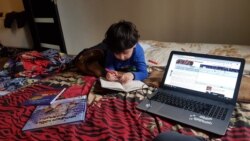For many people around the world, self-isolation is no longer a goodwill gesture, but what a national quarantine or state of emergency requires. But how can you spend all day at home -- work, study, and have fun – and still keep your cool? To find out, Current Time spoke with a home-schooling advocate, a time-management trainer, and a psychologist.
How Can I Teach My Children?
Oksana Aprelskaya is the founder of the @freefromschool project and organizer of the I Live - I Study free-form schooling festival (#яучусьфест). Aprelskaya’s 13-year-old daughter has been entirely educated at home. Her 6-year-old son is enrolled in a Waldorf school, which emphasizes engaging with children as creative individuals.
It's unlikely that children will be quarantined for more than two months, and it’s not in the interests of their parents to readjust because, at the end, they are unlikely to want to continue homeschooling their children. But what I would suggest is to use the time efficiently, strengthen your relations with each other, and take a fresh look at each other. Parents should look at whom their children are, in reality, and children at whom their parents are. Not within the confines of a system, but at home, in a warm atmosphere built on love and trust.
How To Get Started With Home Schooling
For starters, I would suggest talking with children about what they like about school and what they don't like; in general, about what is interesting for them, in the broadest sense. When parents think about switching to family education, I usually ask them to think about what education is, what are the criteria for education, what are their specific education goals. It’s essential to define what’s important and what is not. And when the children return to school, perhaps they’ll react differently to things that they did not like before. It will be easier for them to readjust their attitude.
How To Schedule Home Schooling
In theater rehearsals, there’s a practice called a table read, when everyone reads the play and discusses it. So here, I would recommend first to arrange a table read for schooling, to discuss how it will be set up in your house.
When does a child feel more alert and able to do something – in the morning or evening? Maybe when he has just eaten, or maybe, on the contrary, when he is not very full?
Often the ability to perceive and concentrate is tied to physiology. In keeping with that, you can choose a comfortable way to organize the teaching.
For example, if my daughter doesn’t begin in the morning, then it’s difficult for her to adjust to the timetable and to complete a certain number of assignments in a day. Therefore, she wakes up, has breakfast, has a shower, and starts studying.
If a child is used to waking up at 7 in the morning and going to school, it will be easy to come to an agreement with him or her and to draw up the same timetable for lessons at home.
How To Help Organize Your Child’s Studying
I suggest you listen carefully to your child. Not like, "We are parents, we are smart, we came up with everything for you. Sit down and do it!" On the contrary, the approach should be: "How will it be comfortable for you?"
By the way, this will make your relations stronger. It will show the child that he or she is interesting for who they are. And parents can discover a lot of new and interesting things about their children.
If the children did not know how to organize their time before, of course, they will need help and support. Work out a timetable together – and parents must take the responsibility of supporting the child with this timetable. But it’s important to be flexible and learn to see when the child is tired and needs to take a break.
This is especially important in elementary school. For example, a preschool child is not used to being simply ordered to take out a pen and write something down. It’s an unusual process for them: opening a school bag, getting out the pencil case, getting a pen, then writing.
Elementary school requires a lot of parental help in terms of organizing the process. If the child is perceptive and knows how to do it himself, you can relax and specify the time when the child will be busy with certain things.
What To Do With A Child’s Gadgets
This is a complex topic that causes a lot of clashes and impassioned arguments. There are studies confirming that gadgets are harmful. There are studies reporting that they’re safe. Each family must develop its own rules: What do we do with phones and online entertainment while studying at home?
If the learning will take place online, then the child will need Internet access. If there’s no dependency [on the Internet], this is not a problem. A child with dependency will be tempted to get distracted; for example, with YouTube or computer games.
You can say, "I see it bothers you. What do you think? Let’s agree that we’ll put the phones away during lessons.” The main thing is to talk honestly about this problem.
The parent is the adult, the leader. But I do not advise resolving the issue by confiscating [the child’s] property. It’s important to be able to take responsibility, and, at the same time, maintain honesty and a respectful attitude toward the child.
Let’s be role models for our children. Parents working from home who do not hang out all the time on the Internet and do not watch endless [TV] series are great role models for children. This is a great example that proves that the Internet is not only entertainment, but also a window onto the world, where you can study and work.
Do I Need To Become My Child’s Teacher?
This is always the key question. A parent knows his or her child much better than any other people who have not lived with them all their lives. If the parent is attentive to the child, then he knows what key to use and how to explain the things that the child does not understand.
It is important to interact with the school. What’s the format of the sent assignment? Some [teachers] give links to … online schools. Others organize online conference calls for the class, where a teacher teaches a lesson via Skype or Zoom and the children have to be present.
How much the parent is involved in this can vary significantly, depending on the particular school. But the parent will need to act as the organizer; especially if his or her children are in primary school. In family education, parents most often take up the function of managers of the educational process, and not that of teachers.
If you do not like to teach your child, please, do not do this. This will greatly increase the tension between you. It’s better to find online teachers.
In quarantine conditions, this is easier because, usually, there’s still communication with your school teachers. Plus, many online resources have opened access to their platforms – you can use them.
(For Russian-speakers: For elementary school, materials from Uchi.ru are suitable. The online school Foxford has opened classes for middle school and college. The Letovo School has excellent online platforms with different lessons that you can use.) Now there is also free access to many MOOCs (Massive Open Online Courses).
Don’t be ashamed to use Google to find answers to questions. You can decide to spend time teaching your child to learn, to search for information independently, and to formulate the relevant queries on Google. It’s important that the child knows how to receive information not only from an intermediary, such as a teacher or from a textbook as the only source, but that they know themselves how to search for answers.
How To Work From Home And Plan Your Day
Olga Polishchuk is a coach for workaholics, an adult development specialist, and co-founder of the Mind Room project on regulating the mind at work.
Habits, the routine of life: This is a system that allows our brain not to waste time and energy on uncustomary activities. For example, in the morning, we have breakfast -- or we don’t have time to have breakfast, and we hastily swallow coffee on the go. We run, take the subway, and scroll through the Facebook newsfeed during the entire trip, not noticing how we traveled 40 minutes to the office. A quarantine is a new circumstance, and for many it can become a stress factor.
How To Get Out Of The Habit Of Working In An Office
We often don’t think about the work process itself. And then it turns out that the team is very important for you, and that you are used to solving a bunch of issues in person. Going and talking with someone is a way to solve a situation. And now you need to write or call. The level of influence that you exert in person and in a message is different.
You are used to communicating verbally. To do the same in writing, your brain needs to exert energy. You need to wait a while for the habit to take shape.
But people are impatient; they want everything to work out right away! If it doesn’t work out, some will start blaming themselves for not being effective in the new circumstances, and this will make them uncomfortable. But something that, at first, seemed awkward might become enjoyable later.
However, there is no universal way for how to work more efficiently. Many will be surprised how cool it is to live without an open space: I can get up, get ready, and do everything quickly. What I did in six hours, I can do at home in three. But for someone else, novelty can [negatively] affect productivity.
How To Agree With Colleagues Online
If you used to work offline, and now work in the cloud, it is important to develop the collective rules of the game, something that will help facilitate the process. This will be especially useful for those whose entire team has completely switched to working remotely.
For a while, you can agree on how you interact if, for example, you do not receive an answer right away. You will have rules that help people not to feel alienated communication-wise.
Through a message, you cannot sense the mood, intonation. For extroverted people, this can be a problem. Therefore, I would suggest that people like this clarify in writing what exactly was meant.
The American experience may be useful. In companies there, people started to create special chats for non-working communication, like water-cooler chats. You can also create work and non-work chats in which you and your colleagues can discuss your new work experience from home.
How To Control Everything If You Are The Boss
It’s important not to overdo it with control. The desire to control is understandable, but it must be within target. You can organize an online meeting where you discuss plans for the day and goals. And introduce routines: For example, at the end of the day, you want a general report in the chat room.
Many teams have a tradition of giving status updates at the end of the day. Everyone makes a report about his or her particular work day. There may be non-standard questions in this report: What we did well, what we’ve learned. This will encourage the team and help you see how you’re doing.
If you have problems with trusting employees, I would read manuals on working in the cloud: for example, blogs on this subject by companies like Miro, Trello and Slack.
Cloud services have learned to trust quite well: If people aren’t close at hand, this doesn’t mean that they’re not working. If they didn’t respond within three minutes, don’t write hysterical messages. You can set a rule that a response should be provided by email or on the network within two hours. This will create some transparency and clarity.
Workspace And Work Clothes
It’s important to zone the space. If you have a one-room apartment, think about where you will work and where you will sleep. If you live in your bed for two weeks, sleep, watch Netflix, and have sex there, after a while you will begin to discount all this. Changing the environment is important.
It's important to choose your favorite clothes, in which you’re comfortable, when working from home. I don’t propose that you walk around the apartment in stilettos, but if you have three pairs of pajamas, think about which is more comfortable for you to work in, and which to sleep in. Or create for yourself a look for working from home. When you change clothes, it directly causes a change in your psychological state.
If you and your partner have work calls, you can make a call schedule, divide up areas of responsibility, agree who is calling at what time, and who, for example, takes care of a child at that time.
How Not Only To Work, But Also To Live
Schedules are built around routines. If you used to stop by someplace for a cup of coffee and then buy your favorite snack at [the health food store chain] VuksVill on the way to work, perhaps you’ll miss it.
Think about what you will cook in the 15 minutes you used to spend on this. You might enjoy eating breakfast slowly. I would suggest that those who do not cook at all try cooking at least one dish on their own. Since it also will entail taking care of yourself, this process will make you feel alive.
I would suggest people put gaps between the phone, the computer, and waking up. Many wake up, pick up the phone, look at their newsfeeds, but then they get into their car, a taxi, or the subway, and go to work. This is a change of picture.
Imagine that you won’t have a change of picture. Try in the morning when you wake up, not to pick up the phone. You can put it on airplane mode and walk around the apartment, meditate, do morning exercises. Find a routine that will separate the beginning of the day and the working hours because all of it will be happening in the same space.
Do I need time management during a quarantine? I would replace the time management question with a question: Where is our attention and what’s our priority? Work takes place where your attention is. If you’re not paying attention to something, then there is no energy, and no schedule will help. Understanding the priorities for the day and the week is what matters. A daily plan cannot be a list of 20 items. Plans must be realistic, so that, as the result of the completed work, the level of energy inside you increases.
Online education is good as an idea, but it is quite often overrated.
It’s like going on vacation and planning to drive 2,000 kilometers in three days. Why and for whom is it necessary? A healthy approach is to consider that a quarantine uses the same amount of work days as before and the same amount of your resources.
It’s wrong to think that now you will have more energy from sitting at home. If you wish, get some of the new knowledge that is now available. If you want to relax and watch Netflix, watch Netflix.
How To Put Up With Yourself And Your Loved Ones
Lydia Ruonala is a practicing analytical psychologist. She is a graduate student at the Moscow Institute of Psychoanalysis.
I'll start with a joke. Petya asks Vasya how he spent his vacation. Vasya replies, "The hotel is super, the sea is clean, the cocktails are delicious, but, overall, it wasn’t the best because I took myself on vacation."
Vasya was unhappy because he had to spend a vacation with himself. You can never get away from yourself. When you’re in isolation, it is much more difficult to run away from your personal or family problems.
When a person cannot go to his usual means of protection -- for example, work (if he is a workaholic and cannot work remotely) or parties (if he is a party-goer) -- then he has a huge amount of time that he is forced to spend with himself. And perhaps he does not know this person at all.
If a person does not know how to entertain himself, if he considers himself boring, if he is used to feeling good only when he’s useful to others, then, in quarantine he can lose these defenses and begin to worry. Often this anxiety reaches a critical point and turns into panic. As [the Soviet satirist Mikhail] Zhvanetsky put it, "You have to run somewhere urgently, but there’s nowhere to run."
'Don’t Demand Anything From Yourself'
I would recommend making a plan at the beginning of the day: what will I do today, what will I pay attention to?
This is a great time to get enough sleep. This is especially true for people living in megacities. You can finally do what you’ve long wanted to, but you never managed to do.
Now, there are a huge number of various resources for online learning. Museums provide an opportunity to virtually wander through their corridors. If you have the Internet, you can have a good time at home. And most importantly, people who are in quarantine can continue to have video chats with friends and acquaintances.
I would recommend getting more down to earth and spending time as simply as possible: For instance, draw or put together puzzles. Things like this are much more like meditation than what is practiced by many people.
For spiritual practices, you need another person who will act as a mirror and be competent in this area. Without it, self-development can become something else; for instance, avoiding reality.
My main advice is to relax and have fun. Relaxing means not demanding anything from yourself. Imagine that you are on a desert island and nobody needs anything from you. Ask yourself: “What would I like to do if I were on such an island?”
What Parents Should Do
It is more difficult for families with children to live through the quarantine; especially for those with a confined living space. Such families have less free space, and this can be a serious test.
It makes sense to start the quarantine by separating duties. If there is more than one adult in the house, it’s important to set a schedule for looking after the children so that another adult can rest, spend some time alone.
A quarantine is a great opportunity to spend time with children, get them into a playful mood. Children can well sense the general mood of adults.
To help children cope with anxiety, you can come up with game situations where isolation is part of the plot. Imagine that you’re in a spaceship and your spaceship flies to Mars. Say: "Now we’ll make space porridge, and now we’ll sleep in space bags."
Talk to the children, understand what they’re interested in, and which heroes they especially like. You are Smesharikis or Luntikis [animated characters from Russian computer games and TV – ed], winter has come, your house is covered with snow, and you are waiting for spring to come.
Older children may be interested in exploring the countries that now have coronavirus, looking for information about the attractions, visiting virtual museums, discussing how to get there from your city, what airports there are, how trains are arranged, and what are the favorite traditional dishes. These can even be cooked at home.
It’s even easier with teens: Just leave them alone and don’t touch them unless they come to talk with you. Don’t be afraid of experimenting, but do not demand too much from yourself. Come up with a few games to choose from for kids. They might not like something or something might go wrong.
Young mothers who went through maternity leave could give excellent master classes now on how to stay at home with your children and not go crazy.
Do not demand ideal behavior from yourself: "My God, I have to get up, tidy myself up in the morning, have fun meeting my children, have fun feeding them, have fun playing with them, practice foreign languages, bake something from salty dough. In addition to all that, in between I have to clean everything, cook, and in no case let them watch YouTube."
This only happens on Instagram. In real life, the children drag their mother out of bed in the morning and, after that, even her phone’s Face ID won’t be able to recognize her. She tries to cook porridge, while simultaneously still dreaming her last dream. It is impossible to demand the ideal from yourself.
In such moments, you can let the children watch more cartoons while you recover. No one ever died from a half-hour of animation.
A quarantine can be an interesting experience for dads who, in Russia, rarely sit with children and do not always realize that women do not have a special organ in their body to help manage them. This skill is formed from experience: The more you communicate with children, the easier it is for you. A change of roles in the family comes with crises, and this is normal.
How To Not Divorce Your Partner
The less opportunity people have to escape from relationships (to their work, social networks, computer games), the more likely it is that there will be crises unfolding during this period – both within yourself and family crises.
As a rule, after the New Year holidays, the number of couples who want to get a divorce greatly increases. Around New Year, people spend more time with each other, which means they are faced with reality. Many couples file for divorce after going on vacation together.
A quarantine can help to get closer, and this rapprochement often occurs through clarifying your relations, through conflict. In general, conflicts are a way to solve a problem. People often believe that loving families do not argue. It is not true. It’s important to talk and find out what worries us and what we don’t like. The issue is in form and intonation.
It is important to organize a personal space. During the quarantine, you can talk about your boundaries if this issue has not been discussed before.
It is especially difficult for mothers to allow themselves not to be guarding the interests of their children 24 hours a day, and to have some free space for themselves as well. This is easier said than done. Mothers have many reasons to motivate themselves to rush into action time and time again.
But it is important to take care of yourself and save your resources, to tell yourself “Yes, I have the right to have my own life. I am not only a mother, wife, husband, father, or employee. First of all, I am a person with my needs and interests.”
Now is the time to take care of you. As a last resort, do not hesitate to seek professional help.













Facebook Forum